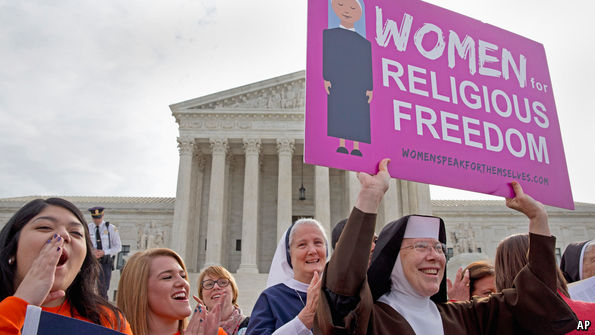Christian groups have protested a portion of the U.S.
Health Care law that includes birth control coverage. The groups opposed to
providing contraceptives argue their right to deny services based on religious
freedom.
The issue is before the U.S. Supreme Court. The article
in the Economist
(13 April 2016) provides details of the concerns and reports an “extraordinary”
effort to find a resolution. The response to this effort appears to require
that female employees have separate coverage outside of a Christian
organization if they wish to obtain contraceptives and related medical
services.
Moral Psychology and the Divide
1. Contraception
continues to be a divisive issue for Christians.
Although the current article focuses on contraception in
the U.S., Christians around the world are divided over the morality of
contraception.
2. Contraceptive
issues are not just about abortion.
Some Christians oppose only those means of contraception
that interrupt a life that has begun. In this view, the contraceptive method
does not prevent conception but ends a life.
But the issue for other Christians is the view that
contraception interferes with God’s purpose. The “Purpose Driven Sex Life”
stems from the Genesis story where God blesses Adam and Eve and says, “be
fruitful and multiply.”
3. Competing
rights and moral responses
It appears to me that the U.S. Supreme Court has affirmed
the rights of women and the rights of religious groups by seeking a way
forward. The responses from interested parties reveal differences.
The religious nonprofits argue for a separate system. In
effect, this protects the conscience of the employers—allowing them to be true
to their faith.
Those opposed to splitting coverage point to the burden
on women. The arguments come from a “care-harm” moral perspective.
4. How to protect
a minority
Most U.S. women use contraceptives, regardless of
religious beliefs. The government has attempted to respect the rights of
religious groups. Separatism sometimes works when people form a cultural
enclave for example, living in a community where all people share similar
morals. I think the Amish communities come close to this separatist model.
In contrast, religious charities within a broad host
culture who hire people holding different values from the employer have not
separated themselves from the culture. Perhaps some religious groups will need
to move toward an Amish-like community where they may have greater religious
freedom.
Contact
Information
Facebook Page: Geoff W. Sutton
Twitter @GeoffWSutton
Website: Geoff W. Sutton
www.suttong.com


Comments
Post a Comment